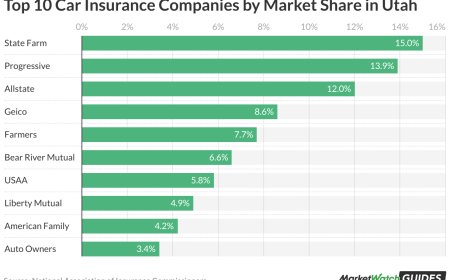Who Are the Leading Companies in AI Development Right Now?
Discover the top companies leading the charge in AI development today. Explore how tech giants and emerging innovators are shaping the future of artificial intelligence across industries worldwide.

Artificial Intelligence (AI) is no longer a futuristic conceptit's a driving force behind global innovation and disruption across industries. From large-scale language models and autonomous systems to recommendation engines and generative tools, AI is reshaping how businesses operate and how people live. But behind this wave of transformation are companiesboth tech titans and ambitious startupsthat are leading the charge.
So, who are the real leaders in AI development today? Which organizations are pushing the boundaries of what AI can do, and why does their work matter?
In this blog, well explore the top companies spearheading AI innovation, examine their contributions to the industry, and highlight how they are shaping the AI-powered future.
1.OpenAI
Why Its Leading:
OpenAI has become a household name thanks to the global success of ChatGPT, a conversational AI based on its GPT (Generative Pre-trained Transformer) models. The launch of GPT-4 and its multimodal capabilities (text, image, code) set a new standard in generative AI.
Major Contributions:
-
GPT-4 and ChatGPT
-
Codex and GitHub Copilot (in partnership with Microsoft)
-
OpenAI API for developers and enterprises
-
AI safety and alignment research
Impact:
OpenAI has redefined human-AI interaction and made generative AI accessible to millions. Its also one of the few companies focused deeply on AI safety, alignment, and governance.
2.Google DeepMind
Why Its Leading:
Originally a UK-based AI lab, DeepMind (a subsidiary of Alphabet) is known for solving some of the most complex problems using AI. It gained fame for AlphaGo and has continued with innovations like AlphaFold, which revolutionized protein structure prediction.
Major Contributions:
-
AlphaGo, AlphaZero (AI for board games and learning)
-
AlphaFold (used in biological research and drug discovery)
-
Gemini AI (Googles next-generation multimodal AI model)
-
Scientific AI for climate modeling, energy efficiency, and more
Impact:
DeepMind is known for tackling scientific and philosophical challenges using AI. Its work is both cutting-edge and grounded in real-world impact across medicine, science, and ethics.
3.Microsoft
Why Its Leading:
Microsoft has positioned itself as an enterprise AI leader, investing billions into OpenAI and integrating AI into its entire product suitefrom Azure to Office 365.
Major Contributions:
-
Azure AI platform and infrastructure
-
GitHub Copilot (AI-assisted code writing)
-
AI-enhanced tools in Word, Excel, and Outlook (Microsoft 365 Copilot)
-
Investment and partnership with OpenAI
Impact:
Microsoft's strategy focuses on AI as a productivity booster. Its deep cloud infrastructure, developer tools, and enterprise reach make it a powerful force in scaling AI globally.
4.Amazon Web Services (AWS)
Why Its Leading:
AWS remains a foundational player in AI infrastructure and services. Through tools like SageMaker and AI chips (Trainium, Inferentia), Amazon enables developers and enterprises to build and deploy AI at scale.
Major Contributions:
-
Amazon SageMaker (machine learning development platform)
-
AI-powered Alexa and recommendation engines
-
Custom AI chips for training and inference
-
Bedrock and Titan (generative AI models)
Impact:
AWS is central to enterprise adoption of AI, providing scalable and cost-effective infrastructure that supports AI projects from startups to Fortune 500 companies.
5.NVIDIA
Why Its Leading:
NVIDIA might be known for GPUs, but it's become the backbone of modern AI development. Its hardware powers training and inference for many top AI models globally.
Major Contributions:
-
GPUs for AI workloads (A100, H100, etc.)
-
CUDA and cuDNN for AI acceleration
-
AI research and model training platforms
-
Omniverse and generative AI frameworks
Impact:
Without NVIDIAs computing power, much of today's AI development wouldnt be possible. Its a quiet yet essential player in the AI ecosystem.
6.Meta (Facebook AI Research FAIR)
Why Its Leading:
Meta has invested heavily in long-term AI research, open-source models, and large-scale systems. From LLaMA models to AI in social media moderation, Metas work has broad implications.
Major Contributions:
-
LLaMA and LLaMA 2 (open-source large language models)
-
PyTorch (widely used ML framework)
-
AI content moderation and recommendation algorithms
-
AI-generated avatars and multimodal research
Impact:
Meta has taken a strong open-source stance, democratizing access to foundational AI models. Its AI is also core to how billions experience content on Facebook and Instagram.
7.Anthropic
Why Its Leading:
Founded by ex-OpenAI employees, Anthropic is focused on building safer, more interpretable AI systems. Its Claude language models are emerging as strong competitors to ChatGPT.
Major Contributions:
-
Claude 1, 2, and 3 (AI assistants known for safe, aligned behavior)
-
Constitutional AI approach to ethics and training
-
AI safety and interpretability research
Impact:
Anthropic aims to set standards for responsible AI. It's particularly influential in discussions around alignment, regulation, and enterprise deployment of AI assistants.
8.IBM
Why Its Leading:
A pioneer in AI since the days of Deep Blue and Watson, IBM now focuses on hybrid AI solutions, enterprise AI, and trustworthy AI frameworks.
Major Contributions:
-
IBM Watsonx (new generation of enterprise AI tools)
-
AI for healthcare, finance, and cybersecurity
-
Research into explainable and ethical AI
-
Strong emphasis on AI governance and compliance
Impact:
IBM remains a key player in regulated industries, helping organizations apply AI in secure, transparent, and compliant ways.
9.Tesla
Why Its Leading:
Tesla uses AI for a very specific but highly ambitious goal: autonomous driving. With its own Dojo supercomputer and proprietary neural networks, Tesla is pioneering AI in real-time decision-making.
Major Contributions:
-
Full Self-Driving (FSD) software
-
AI for object detection, path planning, and vehicle control
-
Dojo AI supercomputer
-
Vision-only approach to autonomy
Impact:
While controversial, Teslas AI work is pushing the boundaries of real-world AI applications, particularly in robotics and transportation.
10.Baidu and Alibaba (China)
Why Theyre Leading:
Chinas tech giants are building their own AI ecosystems, rivaling the West in areas like search, cloud AI, and generative models.
Major Contributions:
-
Baidus Ernie Bot (Chinese equivalent to ChatGPT)
-
Alibabas Tongyi Qianwen (enterprise AI assistant)
-
AI cloud platforms and NLP tools
-
Investments in AI chips and infrastructure
Impact:
These companies are helping China compete on the global AI stage, developing models tailored to local language, culture, and needs.
Other Noteworthy Players
-
Hugging Face: Open-source model hosting and ML democratization.
-
Cohere: Focused on enterprise LLMs with customizable APIs.
-
Stability AI: Creators of Stable Diffusion, pushing generative art and open models.
-
Runway ML: Leader in video-based generative AI tools.
The Race Ahead
The AI development landscape is dynamic and highly competitive. Some companies lead in foundational research, while others dominate in infrastructure or application. A few common themes among leading companies include:
-
Emphasis on Generative AI: From text to image and video, generative capabilities are driving the next wave of adoption.
-
Open-Source Contributions: Many leaders are contributing to the global AI community through open tools and research.
-
AI for Good and Safety: Responsible AI development is increasingly a priority.
-
Cross-industry Collaboration: Leaders are forming alliances to accelerate innovation in healthcare, education, logistics, and beyond.
Final Thoughts
The companies leading AI development today are shaping the future of work, creativity, communication, and even governance. Their innovations impact billions of lives, and their decisions set the ethical and technological tone for decades to come.
Whether youre an entrepreneur, a developer, or just an observer, understanding who these players areand what theyre buildingis key to navigating the evolving AI era. As the pace of development accelerates, expect this list to grow and evolve, bringing new disruptors and visionaries into the spotlight.



































